
-
Find the right food for your petTake this quiz to see which food may be the best for your furry friend.Find the right food for your petTake this quiz to see which food may be the best for your furry friend.Featured products
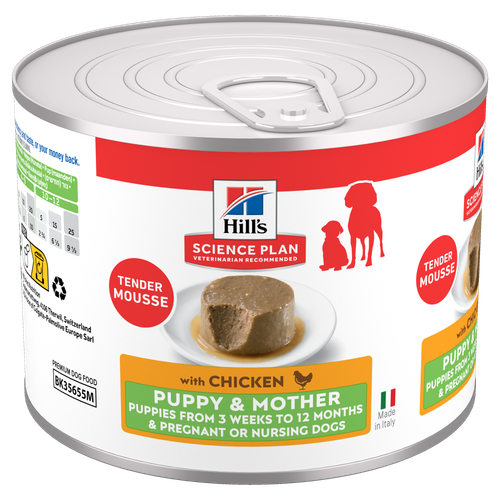 Puppy & Mother Tender Mousse Dog Food
Puppy & Mother Tender Mousse Dog FoodHill's Science Plan Puppy & Mother Tender Mousse Dog Food with Chicken is a complete premium pet food for puppies and pregnant or nursing dogs. Formulated with chicken and other specially selected ingredients, including minerals and antioxidants to support gut health and optimal growth, it comes in a soft mousse texture they'll love.
Shop Now Perfect Weight Small & Mini Adult Dog Food
Perfect Weight Small & Mini Adult Dog FoodHill's Science Plan Adult Small & Mini Dog Food with Turkey is a complete premium pet food for adult small dogs from 1 year old that are prone to weight gain or slightly overweight. This deliciously smooth mousse is formulated to deliver the appropriate amount of energy to support weight maintenance in adult dogs.
Shop Now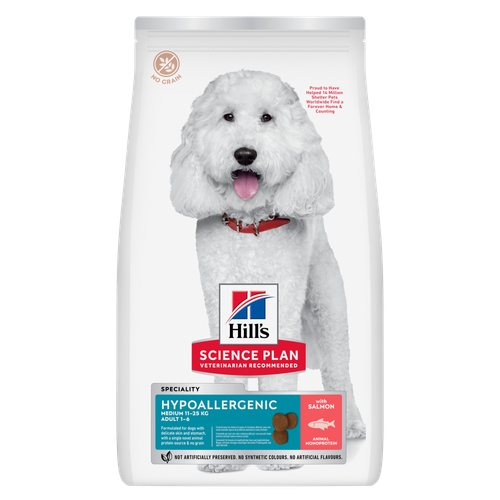 Hypoallergenic Medium Adult Dog Food
Hypoallergenic Medium Adult Dog FoodScience Plan Hypoallergenic Medium Adult dog food with Salmon is a gentle, science-led formula crafted for dogs with food sensitivities. Made with carefully selected, high-quality novel proteins and no grains, it’s tailored to minimise common triggers that can lead to skin and digestive discomfort.
Shop NowFeatured products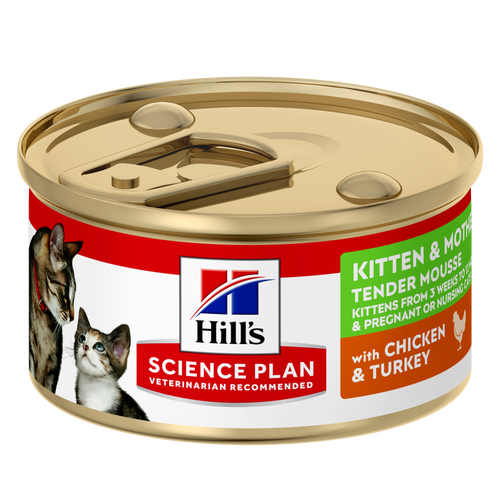 Kitten & Mother Tender Mousse Cat Food
Kitten & Mother Tender Mousse Cat FoodHill's Science Plan Kitten & Mother Tender Mousse Cat Food with Chicken & Turkey is a complete premium pet food for kittens from weaning until 1 year old and for pregnant and nursing cats. Formulated with chicken, turkey and other specially selected ingredients to support gut health and optimal growth. It comes in a soft mousse texture they'll love.
Shop Now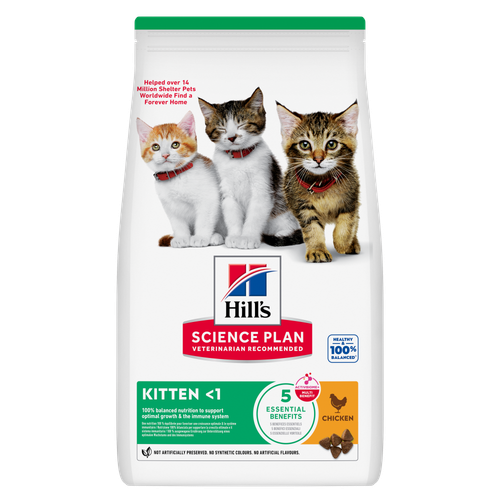 Kitten Food
Kitten FoodHill's Science Plan Sterilised Kitten Cat Food with Chicken is specially formulated with ActivBiome+ Multi-Benefit Technology. This food is carefully formulated for the developmental needs of kittens, so they get the best start in life & grow to their full potential.
Shop Now Hypoallergenic Dry Cat Food
Hypoallergenic Dry Cat FoodHILL'S SCIENCE PLAN Hypoallergenic Adult cat food with egg & insect protein is a complete pet food for adult cat 1–6 years old. It's formulated for cats with delicate skin and stomach, with limited high quality novel protein sources & no grain.
Shop Now -
Dog
- Dog Tips & Articles
-
Health Category
- Weight
- Food & Environmental Sensitivities
- Urinary
- Digestive
- Joint
- Kidney
-
Life Stage
- Puppy Nutrition
- Adult Nutrition
- Senior Nutrition
Cat- Cat Tips & Articles
-
Health Category
- Weight
- Skin & Food Sensitivities
- Urinary
- Digestive
- Kidney
-
Life Stage
- Kitten Nutrition
- Adult Nutrition
Featured articles What Cleaning Products Are Safe for Pets?
What Cleaning Products Are Safe for Pets?Learn which cleaning product ingredients can be hazardous for dogs & cats, which alternatives are safer and tips for using cleaning products around pets.
Read MoreTips for Working From Home With a PetGet helpful information on how to get all of your work done while keeping your dog or cat entertained when working from home.
Read More Tips For Mixing Wet And Dry Pet Food
Tips For Mixing Wet And Dry Pet FoodDiscover tips for mixing wet and dry pet food to ensure balanced nutrition and variety for your pet. For comprehensive feeding advice, visit Hill's Pet UK.
Read More -
Food & environmental sensitivities in dogs
Food & environmental sensitivities in dogs
Does your dog have signs of food or environmental sensitivities?
Dry, itchy skin is just one of the many symptoms that may indicate your dog is experiencing a bigger problem brought on by environmental sensitivities. In rare cases, these may also be signs of food sensitivities in dogs. These signs can be long-term, recurring, and should be noted to your vet.
















What causes sensitivities in dogs?
One of the most difficult things on a dog’s path to recovery is determining what is causing their reactions. There are two main types of sensitivities that dogs face: food and environmental. The majority of sensitivities in dogs are from environmental causes, but certain ingredients in food may cause reactions as well.
What causes sensitivities in dogs?
One of the most difficult things on a dog’s path to recovery is determining what is causing their reactions. There are two main types of sensitivities that dogs face: food and environmental. The majority of sensitivities in dogs are from environmental causes, but certain ingredients in food may cause reactions as well.


Environmental sensitivities
Recurring signs of environmental sensitivities may be caused by grasses, pollen or biting insects. They can be addressed with a multimodal treatment including medication to help reduce the immediate symptoms and nutrition for effective long-term management.


Environmental sensitivities
Recurring signs of environmental sensitivities may be caused by grasses, pollen or biting insects. They can be addressed with a multimodal treatment including medication to help reduce the immediate symptoms and nutrition for effective long-term management.


Food sensitivities
Food sensitivities in dogs are actually very uncommon — in fact, only 10% of dogs experience food sensitivities! [1] Rarely, however, some dogs may experience reactions to certain ingredients, and they are identified through food elimination trials conducted by your veterinarian. A food elimination trial is a process of finding and removing the food ingredient causing skin issues or digestive upsets.


Food sensitivities
Food sensitivities in dogs are actually very uncommon — in fact, only 10% of dogs experience food sensitivities! [1] Rarely, however, some dogs may experience reactions to certain ingredients, and they are identified through food elimination trials conducted by your veterinarian. A food elimination trial is a process of finding and removing the food ingredient causing skin issues or digestive upsets.
Managing a dog’s sensitivities
Managing a dog’s sensitivities can be a challenging process, and your first step should be visiting your veterinarian. They will help you find the right combination of nutrition, medication, and/or topicals for your dog.


Living with a dog with food or environmental sensitivities can cause you both to be restless, but the road to improvement will require time, patience and trust in your vet. Remember — just like humans, every dog is unique, and the best solution will come from working with a professional to address your pet’s specific needs. Together, you’ll get on the right track to helping your best friend feel like their best self.


Clinical nutrition plays an important role in the long-term management of sensitivities in dogs. The right nutrition can promote healthy skin from within and help alleviate your dog’s signs. Even with treatment, some dogs may have recurring signs that will require adjustments along the way, and your veterinarian will be a helpful resource in managing your dog’s sensitivities.


A vet may prescribe medication to help alleviate your dog’s signs of sensitivities. If you are wondering what you can give your dog for sensitivities, only give medication as recommended by your vet.


Topicals can be used for managing skin conditions in dogs. There are various deliveries for topicals like shampoos, lotions, sprays or ointments. Reach out to your veterinarian to ensure a specific topical is appropriate for your pet’s skin condition and life stage.


Understanding nutritional support for food and environmental sensitivities
You’ll want to ask your vet about a few things when it comes to the suitable dog food for food or environmental sensitivities. For food sensitivities, ask about clinical dog food with a single novel protein or hydrolysed protein that is unlikely to cause a reaction. For environmental sensitivities ask about nutrition that can nourish and help protect from environmental irritants.
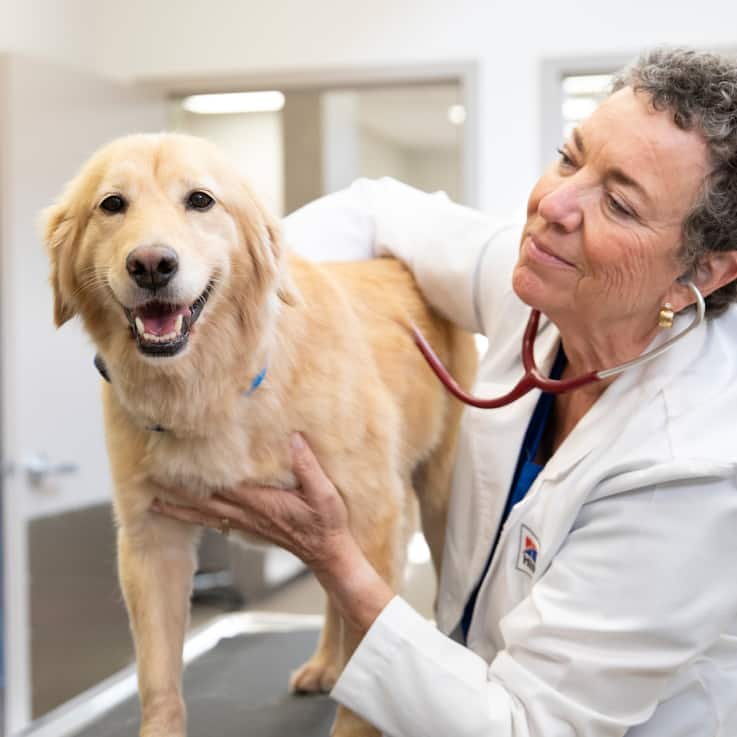

Time to see a veterinarian?
If you notice behaviour changes or sense something is off with your dog, it may be time to schedule a vet visit.
You also may want to ask your vet if clinical nutrition would be appropriate for your dog. Hill's Prescription Diet foods are developed by a team of Ph.D. nutritionists and veterinarians, and require a vet recommendation for purchase. Schedule an appointment so your vet can assess your pet's health and nutritional needs.

